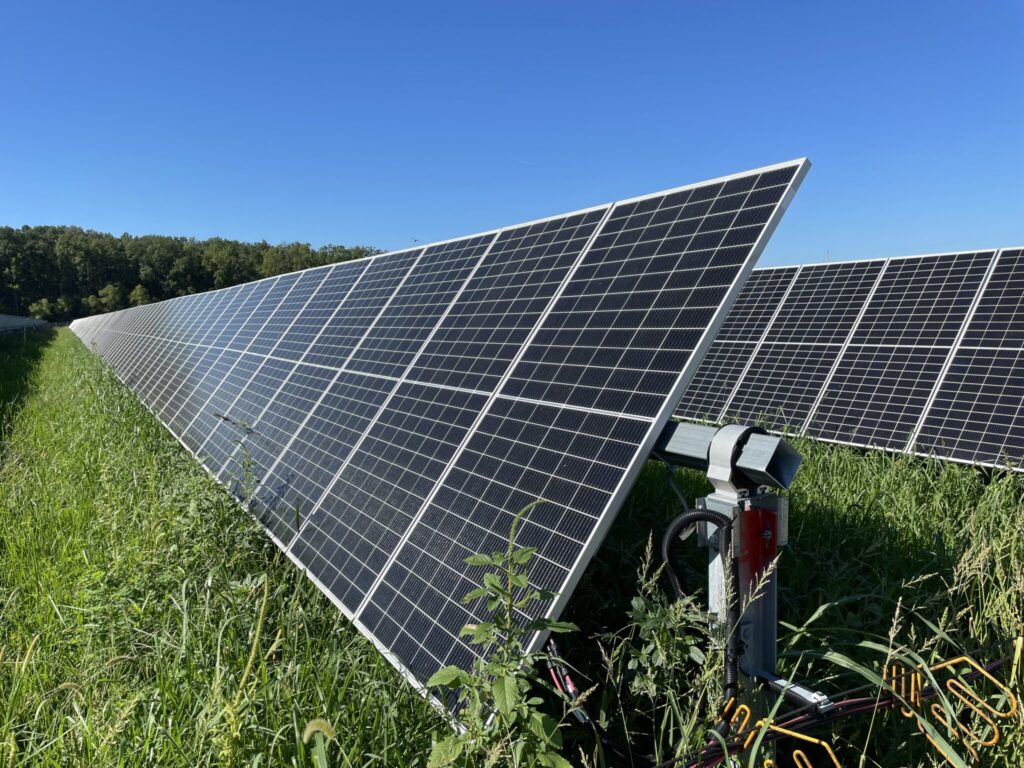A solar array. (Robert Zullo/ States Newsroom)
By Kartik Amarnath
There is an absurd myth that is aging just as poorly as our nation’s crumbling coal plants: that renewable energy is more expensive than fossil fuels.
Pennsylvania is consistently one of the highest producers and consumers of fossil fuels, one of the worst states for renewables, and yet Pennsylvanians continue to experience unprecedented spikes in electricity costs. Despite what will be said by a federal government that is unapologetically pro-fossil fuels, Pennsylvania demonstrates how fossil fuel dependence locks customers into having to pay a premium for unreliable and polluting energy. But even with the cards stacked against us, all hope is not lost. Last year, PECO (formerly the Philadelphia Electric Company) committed to commissioning the state’s largest ever utility solar project because activists demonstrated how purchasing energy from more renewables would reduce costs for customers. It was a small step, but so long as we understand what actually makes our bills more affordable, we still have a say in our energy future regardless of what may come out of Washington.
In the summer of 2023, an op-ed discussed PECO’s Default Service Plan as a make-or-break opportunity to salvage an energy system that is failing Philadelphians. The Default Service Plan is a four-year plan for purchasing the energy that is used by more than three quarters of PECO customers. In 2024, PECO submitted a plan to state regulators outlining the energy it intended to procure until 2029. That energy was almost entirely fossil fuels. Power Interfaith, Clean Air Council, PennEnvironment, the Sierra Club, Physicians for Social Responsibility Pennsylvania, and Vote Solar formed a coalition known as the Energy Justice Advocates and intervened. We showed that PECO could have saved customers over $65 million over the past four years if they had used just a modestly higher amount of solar. PECO has consistently gotten a paltry 0.5% of its total energy from solar. After the public demanded better, PECO finally agreed to source 25 megawatts of local Pennsylvania solar, or enough renewable energy to power roughly 3,000 homes.
PECO has 1.7 million customers, so 3,000 homes may not seem like much. Frankly it isn’t, and we desperately need more local renewables to continue to drive down utility bills and modernize our aging grid infrastructure. But that doesn’t take away from how important this win is. Utility companies mostly rely on business models that are over a century old, and reforming utility business practices can be especially difficult in a state whose energy economy has notoriously been business-as-usual. The fact that the state’s largest electric company has just committed to one of the largest utility-driven solar projects means the door has swung open, and it is our job as advocates to keep it open. This first modest commitment to solar energy demonstrates that utility companies can in fact do what is necessary for customers and society.
Utility business models are no longer frozen in time; amidst an affordability and climate crisis, they can and should shift to accommodate the needs of the households they serve. When done right, investing in a clean energy future meets the urgent needs of our present. Electricity costs are increasing because of our aging infrastructure, the price volatility of natural gas, the damages inflicted on our grid by increasingly frequent and ferocious extreme weather events, and utilities trying to meet projected growth of large AI-driven data centers. Addressing these challenges isn’t simple, but renewable energy can no longer be seen as part of the problem. It is an essential feature of the solution.
Washington may not always be kind to renewables or our climate. But when it comes to our energy system, more governing power actually lies with the states. We cannot get lost in the dramas of the White House and Capitol Hill while utility companies in our home states double down on more-of-the-same. Armed with the facts and reason to hope, in Pennsylvania we’re just getting started.
Kartik Amarnath is Vote Solar’s mid-Atlantic regulatory director. In this role, he supports state-level efforts to transition equitably to clean and renewable energy.
Read the full article here
